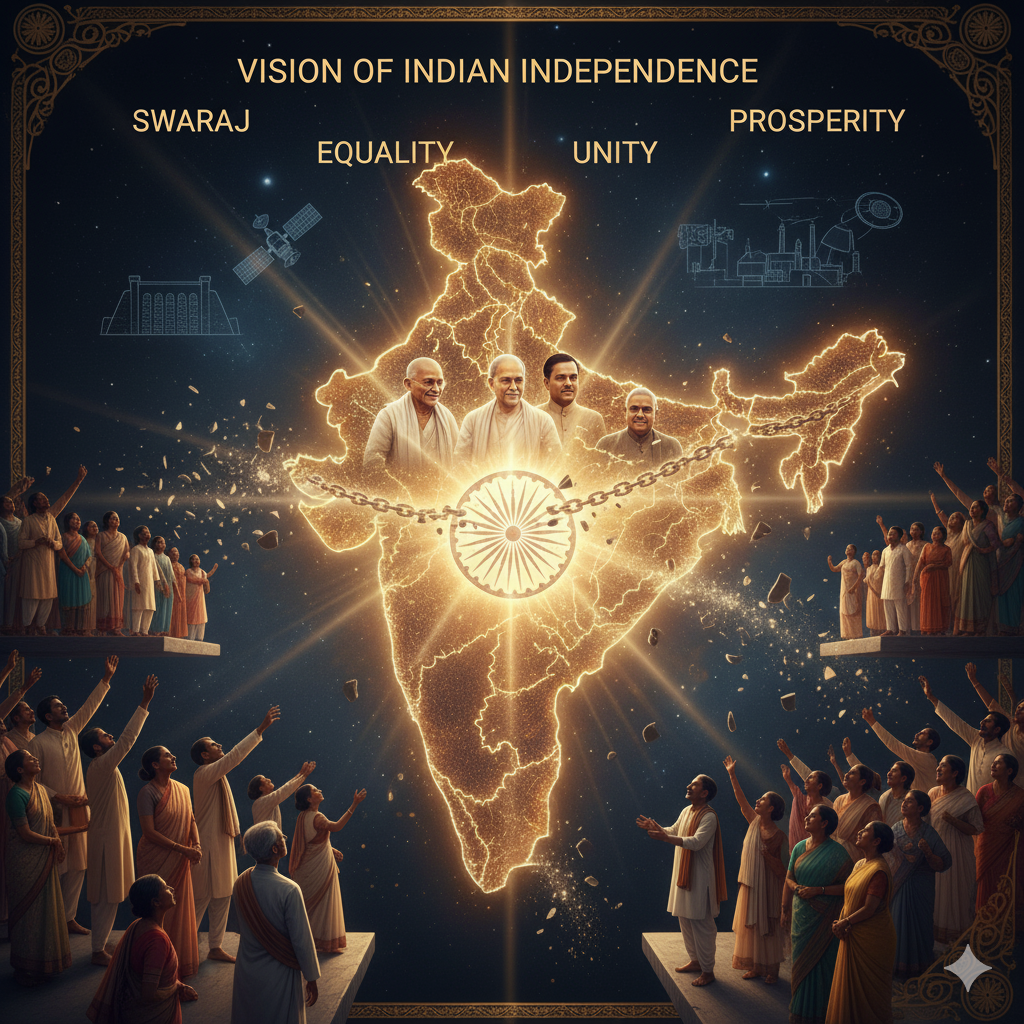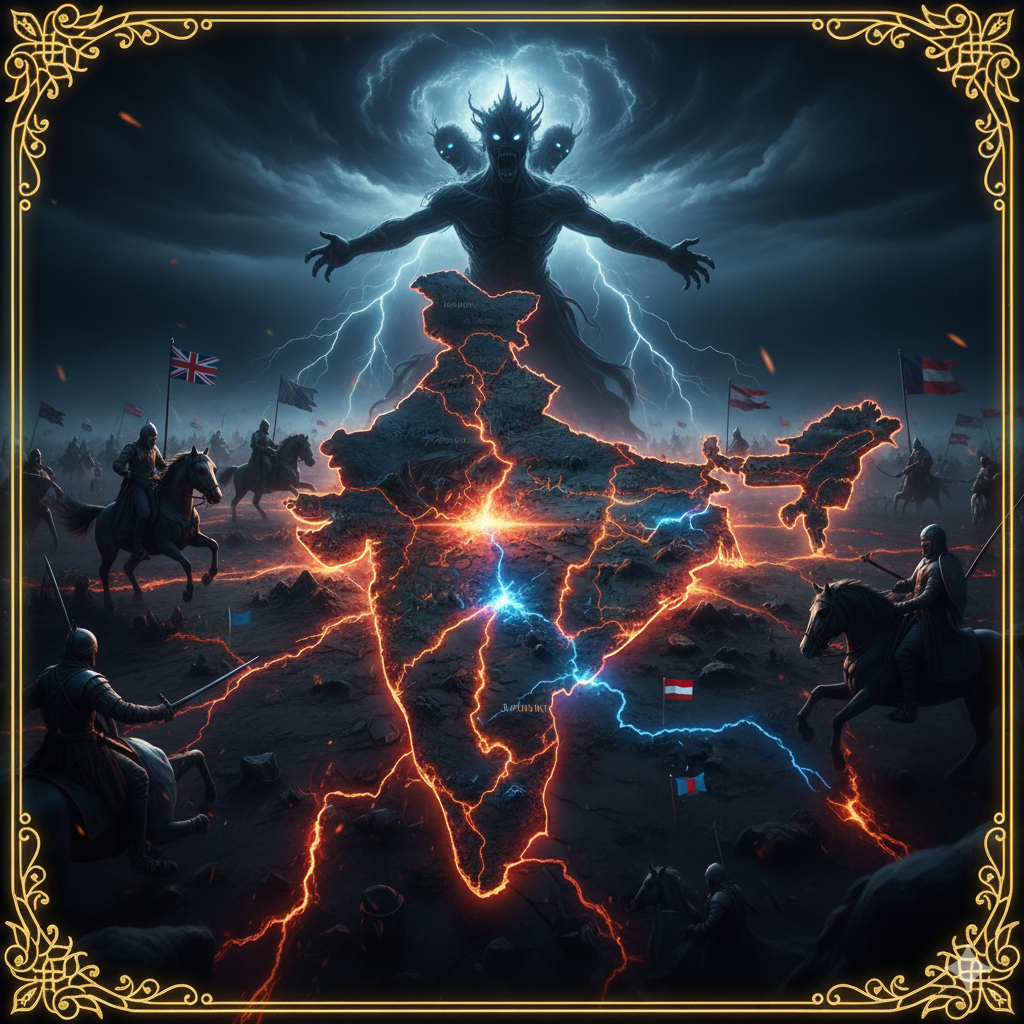Introduction
The emergence of the Indian National Congress (INC) in 1885 marked a new phase in the history of India’s struggle for freedom. The early leaders of the Congress, commonly known as the Moderates, represented the first organized expression of Indian political awakening under British rule. They sought to reform the colonial administration through peaceful, constitutional, and gradual methods. Their political ideology was rooted in faith in British justice, belief in liberalism, and the conviction that India could evolve into a self-governing entity within the British Empire.
However, by the end of the nineteenth century, this moderate ideology lost its popular appeal. The moderates failed to convince the Indian masses of the effectiveness of their methods and their proclaimed political goals. The period between 1885 and 1905 is therefore often described as the Moderate Phase of the national movement — a phase that laid the foundation of political consciousness but failed to mobilize the nation in a united struggle for independence.
The Moderate Ideology: Principles and Political Goals
The moderates were the first generation of English-educated Indians who adopted liberal and constitutional methods to secure political and administrative reforms. They were inspired by Western ideas of freedom, rationality, and justice, and believed in the ultimate benevolence of the British Empire.
1. Faith in British Liberalism and Justice
The moderates held that the British rule, despite its faults, was essentially progressive. They believed that the British Parliament and people were guided by liberal democratic values and would respond positively to reasoned demands for reform. Their strategy was based on loyal opposition — criticizing administrative excesses but remaining loyal to the British Crown.
2. Use of Constitutional and Peaceful Methods
They believed that India’s political development should occur through constitutional reforms rather than revolution. They relied on petitions, resolutions, memorials, and speeches to influence public opinion and British policymakers.
3. Goal of Administrative and Legislative Reforms
The moderates demanded:
- Expansion of legislative councils.
- Indianization of higher administrative services.
- Reduction of military expenditure.
- Protection of Indian industries through fiscal reforms.
- Separation of executive and judiciary.
- Greater control over finances by legislative bodies.
4. Belief in Gradualism
The moderates did not demand independence. Instead, they aimed at self-government within the British Empire — somewhat akin to the status of colonies like Canada and Australia. They believed that political progress should come through gradual reform, not confrontation.
Major Moderate Leaders and Their Contributions
The prominent moderate leaders included Dadabhai Naoroji, Surendranath Banerjee, Gopal Krishna Gokhale, Pherozeshah Mehta, M.G. Ranade, and W.C. Bonnerjee. Their collective effort shaped the early phase of Indian nationalism.
- Dadabhai Naoroji – Known as the Grand Old Man of India, Naoroji developed the Drain of Wealth Theory to show how British rule economically exploited India.
- Gopal Krishna Gokhale – Advocated social reform and political education and founded the Servants of India Society (1905) to promote civic consciousness.
- Surendranath Banerjee – Stressed constitutional methods and founded the Indian Association in 1876, a precursor to the INC.
- M.G. Ranade – Emphasized economic and industrial development as the foundation of national regeneration.
While their contributions to political awakening were immense, their failure to translate ideas into mass action ultimately limited their influence.
Achievements of the Moderates
Before evaluating their failure, it is essential to acknowledge their contributions, as they provided the intellectual foundation for later phases of the national movement.
1. Political Awakening
The moderates created an all-India political platform through the Indian National Congress, bringing together educated Indians from different regions and backgrounds.
2. Exposure of Colonial Exploitation
Their writings and speeches revealed the economic drain caused by British policies. Dadabhai Naoroji’s Drain Theory became a key ideological weapon in the nationalist struggle.
3. Development of Political Methods
They introduced modern political techniques — meetings, resolutions, press campaigns, and petitions — which later became tools for mass politics.
4. Creation of National Consciousness
By articulating India’s grievances in a systematic manner, they fostered the idea of a common national identity beyond caste, region, and religion.
5. Advocacy of Social Reform
Moderates supported education, women’s upliftment, and eradication of social evils, linking political progress with social transformation.
Despite these contributions, by the dawn of the twentieth century, the moderates had lost their credibility as effective leaders of the Indian people.
Reasons for the Failure of the Moderates
The decline of the moderates’ influence can be attributed to a combination of internal weaknesses and external developments that changed the nature of Indian politics.
1. Excessive Faith in British Justice
The moderates’ unwavering belief in the fairness and benevolence of British rule proved unrealistic. Their appeals and petitions were largely ignored by the colonial authorities. The British government consistently refused to grant real concessions or share power, demonstrating that the empire’s interests were primarily exploitative.
When Lord Curzon partitioned Bengal in 1905, claiming administrative convenience, it shattered any remaining illusions of benevolent imperialism.
2. Lack of Mass Base
The moderates represented a small, educated middle-class elite. Their movement remained confined to urban centers like Bombay, Calcutta, and Madras. They failed to connect with peasants, workers, and the illiterate masses who formed the majority of Indian society.
Their reliance on polite persuasion and petitions, written in English, further alienated them from the common people.
3. Limited Political Demands
Their political goals were too moderate to inspire enthusiasm. They did not demand complete independence or even self-rule in the immediate sense. Their cautious and gradual approach was perceived as weakness by the younger generation of nationalists.
4. Ineffective Methods
The “prayer, petition, and protest” method was largely ineffective against a colonial regime that valued economic and political control over moral persuasion. The lack of tangible results disillusioned both the public and younger nationalists.
5. British Repression and Indifference
Despite their loyalty, the moderates faced official contempt. Their resolutions were dismissed, and British officials ridiculed them as “political mendicants.” The failure of the 1892 Indian Councils Act to grant significant powers exposed the futility of their strategy.
6. Rise of Economic Nationalism
The moderates exposed the economic drain but lacked a radical program to address it. Their economic criticism created awareness, but they failed to translate this into effective political action. The growing poverty and unemployment in India demanded bolder steps, which the moderates were unwilling to take.
7. Emergence of Extremist Leaders
By the late 1890s, a new generation of leaders — Bal Gangadhar Tilak, Bipin Chandra Pal, and Lala Lajpat Rai — criticized the moderates’ submissive attitude. These Extremists or Assertive Nationalists demanded Swaraj (self-rule) and believed in direct action, boycott, and national education.
The ideological split in the Congress during the 1907 Surat Session reflected this growing disillusionment with moderate politics.
8. Failure to Address Social Realities
The moderates did not pay sufficient attention to the social and economic grievances of peasants, artisans, and workers. Their movement lacked the emotional appeal necessary to mobilize the broader sections of Indian society.
9. Absence of a Clear National Programme
While they identified India’s problems, they lacked a coherent plan to solve them. Their dependence on British goodwill limited their ability to devise independent strategies.
10. Impact of Global Political Developments
The closing years of the nineteenth century saw the rise of aggressive nationalism worldwide — in Ireland, Egypt, and other colonies. In contrast, the moderates’ cautious constitutionalism appeared outdated and uninspiring.
Critical Evaluation of Moderate Politics
Although the moderates failed to achieve their immediate objectives, their historical role cannot be dismissed as futile. Their contribution was evolutionary rather than revolutionary.
1. Foundation of Political Consciousness
They introduced India to the idea of political organization, debate, and public accountability. This political education was essential for the later success of the mass movements.
2. Development of an All-India Outlook
By bringing together leaders from different provinces, they created a national platform for political dialogue. The Congress sessions helped build national unity.
3. Moral and Intellectual Legacy
Their commitment to rational argument and moral appeal shaped the ethical foundations of Indian nationalism. Even leaders like Gandhi later acknowledged their importance in shaping India’s political ethics.
4. Gradualist Strategy as a Historical Necessity
Given the limited political awareness and repressive colonial machinery of the time, a moderate approach was perhaps the only feasible strategy during the 1880s and 1890s.
Thus, while their methods lost relevance by the turn of the century, their contribution to nation-building remained significant.
Transition to the Extremist Phase
The failure of moderate politics paved the way for the emergence of the Extremist Phase (1905–1919). The Partition of Bengal in 1905 became a rallying point for mass mobilization under new methods — Swadeshi, Boycott, and National Education.
Leaders like Bal Gangadhar Tilak declared, “Swaraj is my birthright, and I shall have it,” capturing the spirit of assertive nationalism that replaced the moderate approach.
This ideological shift was not a rejection of moderate ideals but a response to their limitations. The moderates had educated and politicized the Indian elite; the extremists transformed this elite movement into a people’s movement.
Comparison between Moderates and Extremists
| Aspect | Moderates | Extremists |
|---|---|---|
| Time Period | 1885–1905 | 1905–1919 |
| Main Leaders | Naoroji, Gokhale, Banerjee | Tilak, Lajpat Rai, B.C. Pal |
| Goal | Reform within British Empire | Complete Swaraj |
| Method | Petition, persuasion, constitutionalism | Boycott, mass agitation, direct action |
| Mass Participation | Limited | Wide, including peasants and youth |
| View on British Rule | Reformable | Exploitative and oppressive |
This transition signified the maturing of Indian nationalism from loyalist petitions to assertive self-determination.
Legacy of the Moderates
Even though the moderates failed to carry conviction with the nation, their intellectual and moral groundwork endured:
- Political Training: They taught Indians the language of rights and governance.
- Economic Awareness: Their critique of colonial exploitation shaped later nationalist economic policies.
- Constitutional Vision: Their emphasis on rule of law influenced India’s democratic framework after independence.
- Liberal Spirit: They preserved a spirit of rationalism and dialogue within Indian politics.
Thus, their legacy continued to inspire future generations, including Gandhian and Nehruvian thought.
Conclusion
The failure of the moderates by the end of the nineteenth century was not a total defeat but a necessary historical transition. Their ideology of peaceful reform and faith in British justice failed to convince the Indian masses, who had grown impatient under the weight of exploitation and repression. Their limited methods and elitist approach alienated them from popular aspirations.
Yet, the moderates laid the foundation of modern Indian political life — a framework of national consciousness, constitutionalism, and economic critique that guided the freedom struggle in the years to come. The extremists and later Gandhian mass movements built upon this foundation, transforming political awakening into a full-fledged struggle for independence.
In essence, the moderates were the architects of India’s political infancy — their failure a stepping-stone to the nation’s eventual triumph.




